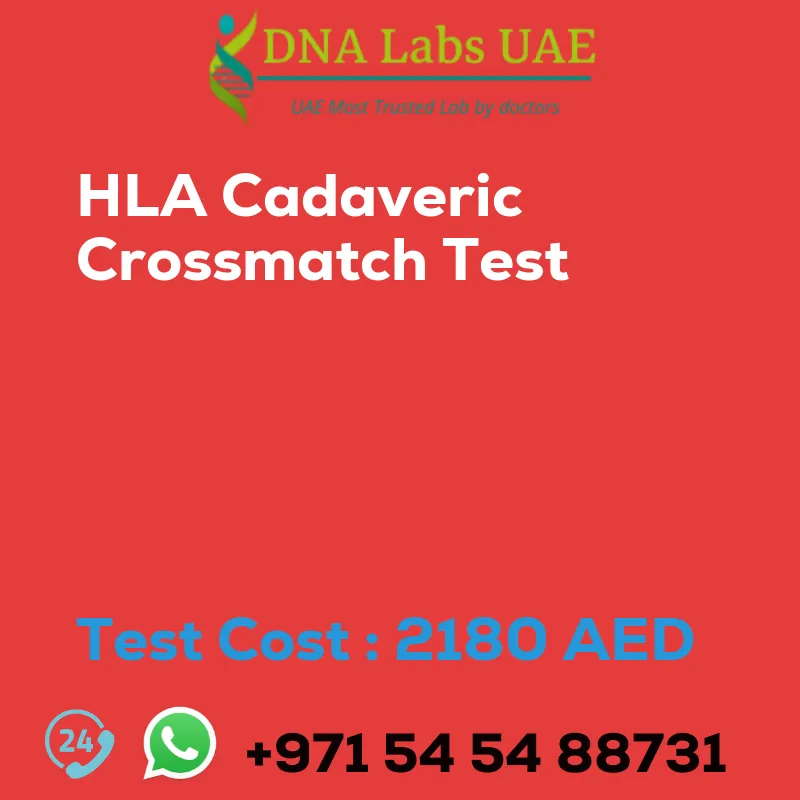HLA CADAVERIC CROSSMATCH Test
At DNA Labs UAE, we offer the HLA cadaveric crossmatch test for organ transplantation, specifically for kidney transplants. This test helps determine the compatibility between the donor and recipient, reducing the risk of rejection and increasing the success rate of the transplant.
Test Cost: AED 2180.0
The HLA cadaveric crossmatch test is available at a cost of AED 2180.0.
Symptoms and Diagnosis
The HLA cadaveric crossmatch test is performed prior to organ transplantation to assess compatibility. During the test, the recipient’s serum is mixed with the donor’s lymphocytes. If the recipient’s antibodies react with the donor’s cells, it indicates a positive crossmatch, which suggests a high risk of rejection if the transplant proceeds. A negative crossmatch, on the other hand, indicates compatibility between the donor and recipient, reducing the risk of rejection.
Sample Condition
Recipient: 6 mL (3 mL min.) whole blood in 1 Yellow Top (ACD) tube AND 3 mL (2 mL min.) serum from 1 SST. Collect specimen preferably 48 hours after dialysis.
Cadaveric Donor: 12 mL (10 mL min.) whole blood in 2 Yellow Top (ACD) tubes. Ship refrigerated. DO NOT FREEZE.
Note: Doctor’s prescription on the letterhead with stamp and a photograph of the recipient is mandatory.
Report Delivery
The test results are typically delivered within 10-12 days.
Method
The HLA cadaveric crossmatch test is performed using the Complement Dependent Cytotoxicity with DTT treatment method.
Test Type
The HLA cadaveric crossmatch test falls under the category of transplantation tests.
Doctor
This test is typically requested by Nephrologists and Gastroenterologists.
Test Department
This test is conducted in the Transplantation department.
Pre Test Information
It is recommended to collect the specimen 48 hours after dialysis. Additionally, a doctor’s prescription on the letterhead with a stamp and a photograph of the recipient is mandatory.
Test Details
The HLA (human leukocyte antigen) cadaveric crossmatch test is a crucial laboratory test performed before organ transplantation, specifically for kidney transplants. It helps determine the compatibility between the donor and recipient. By mixing the recipient’s serum with the donor’s lymphocytes, the test identifies if the recipient’s antibodies react with the donor’s cells. A positive crossmatch indicates a high risk of rejection, usually due to pre-formed antibodies in the recipient’s blood resulting from previous transplants, blood transfusions, or pregnancies. In such cases, the transplant is typically contraindicated. Conversely, a negative crossmatch indicates compatibility, reducing the risk of rejection and allowing the transplant to proceed with a lower risk of complications.
Overall, the HLA cadaveric crossmatch test plays a crucial role in ensuring the success and long-term viability of organ transplantation by assessing the compatibility between the donor and recipient.
| Test Name | HLA CADAVERIC CROSSMATCH Test |
|---|---|
| Components | |
| Price | 2180.0 AED |
| Sample Condition | RECIPIENT: 6 mL (3 mL min.) whole blood in 1 Yellow Top (ACD) tube AND 3 mL (2 mL min.) serum from 1 SST. Collect specimen preferably 48 hours after dialysis.\nCADAVERIC DONOR: 12 mL (10 mL min.) whole blood in 2 Yellow Top (ACD) tubes. Ship refrigerated. DO NOT FREEZE. Doctor’s prescription on the letter head with stamp ANDphotograph of recipientis mandatory. Above specimen requirements are for a single donor being cross matched with a single recipient. For additional cross matches, send additional specimens of recipients. Request as additional tests. |
| Report Delivery | 10-12 days |
| Method | Complement Dependent Cytotoxicity with DTT treatment |
| Test type | Transplantation |
| Doctor | Nephrologist, Gastroenterologist |
| Test Department: | |
| Pre Test Information | Collect specimen preferably 48 hours after dialysis. Doctor’s prescription on the letter head with stamp ANDphotograph of recipientis mandatory. |
| Test Details |
The HLA (human leukocyte antigen) cadaveric crossmatch test is a laboratory test performed prior to organ transplantation, specifically for kidney transplants. It is used to determine if there is compatibility between the donor and recipient. During the test, the recipient’s serum (the liquid part of blood) is mixed with the donor’s lymphocytes (white blood cells). If the recipient’s antibodies react with the donor’s cells, it indicates a positive crossmatch, meaning there is a high risk of rejection if the transplant proceeds. A positive crossmatch result may occur due to the presence of pre-formed antibodies in the recipient’s blood, which can be a result of previous transplants, blood transfusions, or pregnancies. In such cases, the transplant is usually contraindicated. On the other hand, a negative crossmatch indicates compatibility between the donor and recipient, reducing the risk of rejection. This allows the transplant to proceed with a lower risk of complications. Overall, the HLA cadaveric crossmatch test plays a crucial role in ensuring the success and long-term viability of organ transplantation by assessing the compatibility between the donor and recipient. |







